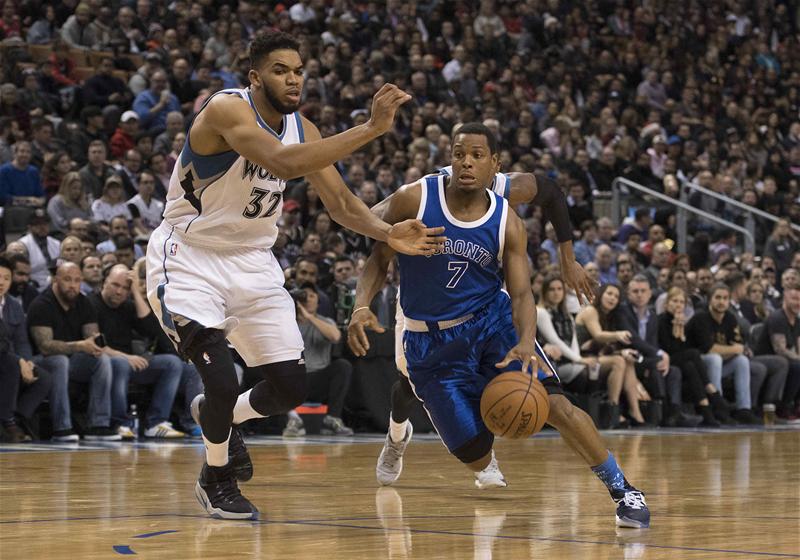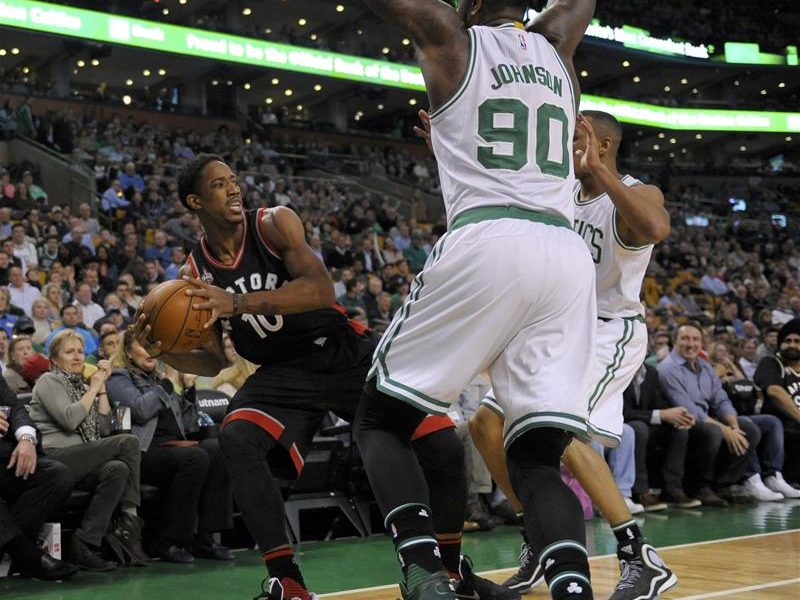Raptors 124, Timberwolves 110 | Box Score | Quick Reaction | Reaction Podcast
The team development curve can be a frustrating one, something the Toronto Raptors franchise knows all too well from two decades of stops and starts and false flirtations with taking the next step. Skill doesn’t always necessarily beget talent, and talent doesn’t always necessarily lead to winning, at least not in the immediate term. Teams, especially young ones, take time to gel, to learn how to sustain performance over the course of games, weeks, and seasons. That process isn’t linear, and even the most exciting of young outfits will take some time to put it all together. More experienced teams, meanwhile, have an easier time maintaining a level of play and, failing that, of finding an extra gear that can make the difference.
To wit, the Raptors more or less sleepwalked through three quarters against an enthralling young Minnesota Timberwolves team on Thursday before flipping a switch in the fourth quarter to secure a 124-110 victory, their seventh in the last eight games.
“They really outplayed us, energy-wise, for three quarters,” Cory Joseph said after the game. “In the last quarter, we stepped it up, rotations were faster, and we were playing with a little bit more grit.”
The game’s flow was all too familiar for the Wolves, as hot starts and late collapses have become their modus operandi. Few teams in the NBA perform better in the first half, while few perform worse in the second half, and exactly zero have stumbled more than the Wolves in crunch time. That format mostly held true Thursday, with the Wolves landing an early punch to a Raptors team that was inexplicably taking them lightly a year after they did so twice and were put in their place. The Raptors found their footing offensively, enough to tie the game entering the half, and then the Wolves took what would appear to be a step forward by actually winning a third quarter, a rarity.
To that point, the Raptors looked somewhere between disinterested and incapable of stopping Minnesota. With Andrew Wiggins dominating thanks to a wonderfully fluid in-between game that rendered even terrific DeMarre Carroll defense irrelevant and Karl-Anthony Towns heating up coming out of the break, the Wolves had found their way to 89 points in three quarters on 54.3-percent shooting. Toronto wasn’t taking care of their own glass – Minnesota grabbed 15 of a potential 31 offensive rebounds through three quarters – and while they weren’t giving Minnesota free trips to the line, it was largely because they weren’t staying close enough to bodies.
Wiggins, Towns, and Zach LaVine are a difficult trio, to be sure, but the Raptors were proving in capable of keeping men in front of them on the perimeter, putting too much pressure on the second-line defense and the resulting rotations. Head coach Dwane Casey tried to get creative, smartly having Jonas Valanciunas show with a high-wall to prevent Ricky Rubio from getting the baseline, and this strategy gummed up the Wolves’ initial attacks at least a bit, especially with their two traditional bigs on the floor. Still, that wrinkle requires Valanciunas to hustle back to the rim, and the elimination of baseline penetration and production of fewer pick-and-pop opportunities was a bandaid on a bullet-hole, as the Wolves would just reset or reverse and re-attack, or simply lean on a one-on-one attack. Patrick Patterson did a great job on Towns when called upon (because of course he did), but Casey tried to stick with Pascal Siakam longer in the second half to no avail. (Casey, in general, had a bit of a strange first three quarters in terms of rotations – playing Terrence Ross rather than Norman Powell early when Carroll had foul trouble, thus breaking up the Kyle Lowry-and-bench unit for the second, for example – but I mostly continue to be impressed by his choices in fourth quarters.)
The nice thing about the Raptors’ struggling for long stretches on defense is that they still score the hell out of the ball. There are few teams as well-equipped for a shootout as the Raptors, and their ability to get to the line (a Minnesota weakness), protect the ball, and knock down their threes proved paramount. Valanciunas was also able to tilt the equation inside, making up for a rough start defensively by being assertive in the opposing paint and really flashing his mid-range game on his way to a 20-point, 10-rebound double-double. DeMar DeRozan also shook off a tough start to the night, settling in by making plays and attacking when that opened up some additional space for him, and he continues to lend an appreciable hand on the glass (if anyone is concerned at Wiggins’ lack of non-points box score totals, DeRozan’s growth as a rebounder and playmaker over the years could be encouraging).
Keeping pace with their abhorrent defense kept the Raptors within striking distance, and that bought them time to let their experience take over and pull away in the fourth.
Whether it’s improved execution or a sense of urgency or just having been there so many times before, the Raptors continue to be one of the league’s best fourth-quarter teams. It makes sense, since that’s what very good teams are supposed to do, and because the Raptors have been one of the league’s best teams so far this season. There’s also been the sense all season that their high-engagement defensive upside is higher than what they’ve been able to show quarter-to-quarter, and that’s both a criticism and a cause for optimism if they can manage to lock in against an opponent bell-to-bell. Whereas the Wolves are still learning how to compete over four quarters, the Raptors have developed this comfort zone knowing they don’t have to be at their best, something that’s somewhat annoying but acceptable for the 82-game slough of the regular season but a habit that needs to die by the time the playoffs roll around.
The defense was the swing factor in the fourth – Minnesota grabbed just one offensive board, turned the ball over five times, and shot 38.9 percent – but it was Lowry’s shot-making that put things out of reach.
“Kyle saved us with his offense,” Casey said.
The distance on some of Lowry’s threes is becoming obscene, as is the confidence everyone in the arena seems to have each time he lets one fly. Lowry finished with 11 assists and 25 points on just 14 field-goal attempts, canning five threes to push his 3-point percentage to 43.5 on the year and to 53.8 percent over the last 13 games. He simply continues to function on a higher level than anyone not named LeBron James (or maybe Jimmy Butler) in the Eastern Conference, and he’s able to swing the tide of a game or drag the Raptors where they need to go if they’re otherwise being stubborn. When defenses have to guard you out to 30 feet, there aren’t a lot of answers.
“Them shots be lucky,” DeRozan argued (before Lowry warned him, “Don’t mention my name, yo,” and fired back that all of DeRozan’s shots are bad shots).
The Raptors would prefer not to have to win this way. Casey was fairly displeased following the game, which is expected when the Raptors allow the kind of opponent shooting percentage (and point total) they did Thursday. The Wolves are good, and they’re incredibly exciting – seriously, this was among the most fun games of the season, except when DeRozan murdered poor Ricky Rubio – but the Raptors rightly feel they should be able to slow teams down at a better rate than they have.
“In spit of our defense,” Casey said. “That’ what I just told the team, if we’re serious about going anywhere, doing anything special, our defense and our attention to detail, our passion for defense, our give-a-crap level for defense has to pick up.”
One of the running storylines of the season is that the Raptors have settled in to their skin as a very good team, more capable of taking care of the teams they should take care of, winning pretty or winning ugly, and closing out games like this (when they’re not against the Sacramento Kings). It’s a testament to how the core has developed together – yesterday was the three-year anniversary of the Rudy Gay trade – and what continuity, familiarity, and communal growth can do for the confidence and effectiveness of a team on nights they don’t have their very best. The Wolves are very likely headed in that same direction, with an embarrassment of young talent. It’s just going to take time, and Toronto’s example is instructive.
“We need to play connected in the fourth,” Wiggins said. “We need to play off each other. That’s what the Raptors do: They played off each other, they were on a string.”
The Raptors, meanwhile, aren’t done growing themselves.



